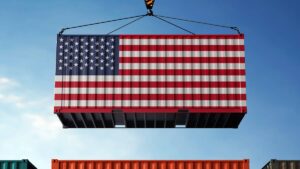MoneyTalks: Megan says it’s time to stake your China claim

Via Getty
The original version of this article contained quotes that cannot be attributed to Megan Stals or Stake.
The article has been amended to reflect this. Stockhead apologises to Ms Stals for the quotes, and the potential they had to mislead readers or present as financial advice.
MoneyTalks is Stockhead’s regular recap of the ASX stocks, sectors and trends that fund managers and analysts are looking at right now.
Today we hear from Megan Stals, market analyst at the Australian share trading app & platform Stake.
Megan’s watching China
She says the Middle Kingdom’s economy faces a Great Wall of challenges right now – burgeoning youth unemployment; an awfully ageing population, preposterous local government debt, and a property crisis for the ages.
“Although September’s GDP surpassed expectations – indicating a few of Beijing’s stimulus measures were taking effect – subsequent data releases have painted a less optimistic picture,” Megan told Stockhead.
“Manufacturing activity contracted in October, signalling a slowdown in construction and services, while CPI showed a price decline of 0.2% year-on-year, following a massive decline in pork prices.
“Given that core inflation, which strips out more volatile products, also dropped by 0.6%, it’s clear that domestic demand continues to be weak.”
In addition, Megan singles out 2023’s big question mark around the Single’s Day shopping festival which appears to have drawn a lacklustre response from local consumers… formerly the absolute backbone of China’s economic growth.
Originally a crafty Jack Ma-inspired 24-hour online shopping binge to celebrate what the kids started calling Singles Day (November 11 each year for the four 1’s of 11.11) the idea now in its 15th iteration and until last year had evolved into a swirling, unending multi-week retail frenzy – complete with celebrity performances and a closing ceremony of Olympian proportions across China’s once unstoppable e-commerce platforms.
This the 15th year of the shopping festival was the most toned down event of them all with no celebrity gala and no official endorsement of ostentatious consumption.
Megan says that given Australia’s reliance on China, this ongoing downturn has been one of the main factors behind the ASX 200’s poor performance in 2023.
“While the more recent economic data suggests a sluggish scenario, it’s clear that China is looking outwards in the hope of stimulating growth, and this could work in favour of Australian stocks over the long term.
“In addition, it increases the likelihood of additional stimulus to recover growth as Beijing faces pressure to achieve its 5% annual GDP target.
“While Australian stocks are unlikely to benefit from a broad Chinese recovery any time soon, Anthony Albanese’s recent visit to China is evidence that relations are thawing, and tariffs on goods like lobster and beef are currently under review, potentially opening pockets of opportunity on the ASX.”
3 ASX Stocks All Set for the China Challenge
Treasury Wine Estates (ASX:TWE)
Things have been happening on the China front for a diversified Treasury Wine Estate.
Megan says the expedited review of tariffs on Australian wine, which is expected to conclude within five months, offers significant promise, and TWE is one to watch.
“Before the establishment of heavy trade tariffs, the Australian wine industry was exporting goods worth $1.3 billion annually, but this has since ground to a halt, leading Treasury Wine’s profits to shrink around 35%.
“The company has since pivoted by diverting high-end red wines from Australia into Thailand, Malaysia, Singapore and Vietnam, but has expressed its desire to return to China when possible.”
Since the tariff review, Treasury Wine’s stock rose by 4% higher, Megan notes.
“But it’s still down by over +17% in the past year, with a long way to go before reaching its pre-pandemic highs.
“Given the recent diplomatic efforts from China, the chances of a restart look more promising, and this would work in favour of Treasury Wines, yet anything can happen in today’s uncertain world. While a continuation of tariffs would be bad news for the stock, the company’s diversification into other parts of Asia has actually worked well, creating some level of protection if the worst case scenario does materialise.
“Investors have also been concerned about Treasury’s $1.6 billion takeover of US winemaker Daou, which initially led the share price to drop by over 7%, following a share placement. Given Treasury Wine’s previous lack of success in the US the jury is still out on whether this deal is wise. However, it’s understandable that the management team will be keen to build a buffer by growing market share outside of China.”
Elders (ASX:ELD)
Megan says the elimination of tariffs on beef imports by 1 January 2024 is a positive for ELD.
“Australia is one of China’s major beef suppliers, capturing 9.5% of the import market through its reputation for quality, and the company’s export and distribution units look set to benefit.
“The company has a well-established and expansive network across rural Australia, with diversified revenue streams including livestock, grain and real estate — however, the stock has dropped significantly since 2022, after adverse weather conditions from La Nina continued to harm profits. That said, it finally delivered some good news last week in the form of better-than-expected full-year results, as falling prices for fertilisers and agricultural chemicals acted as a tailwind.”
And then there’s the recent acquisitions — nine (no less) in the 12 months to September — which Stal reckons are expected to pay off in the coming year.
“Shareholders responded well to the recent result, with shares surging 16% on the news, yet the stock is still down over 28% YTD which could be seen as a potential buying opportunity. Still, the risks are still high given the upcoming El Nino summer, and continued adverse weather events. The stock goes ex-dividend on the 21st of November, so bear that in mind before diving in.”
Sandfire Resources (ASX:SFR)
Megan reckons the struggling property sector in China might have cast some shadows all over iron ore, but it’s not all bad news for Australian commodities.
“China’s been gradually easing unofficial curbs on Australian copper imports and despite the red metal’s connection to construction, this is being offset by China’s EV manufacturing dominance.
“Copper miners have not performed well over the past few months, primarily due to being closely tied to the ups and downs of the global economy, but most analysts are predicting a significant copper deficit over the next decade as the world looks to electrify. While China is ramping up its own production of the metal, its importance to electrification means copper ore imports are still likely to continue for the foreseeable future,” she adds.
“Which brings me to ASX-listed Sandfire which owns the Motheo mine on Botswana’s Kalahari Copper Belt.
“This is one stock that could benefit from China’s increased production of EVs, evidenced by the stock’s steady climb from $4.74 to $6.10 in the last year. While Sandfire Resources’ revenue actually dropped 13% over last year, due to copper’s correlation with the global economy, the long term outlook appears positive, and this is being reflected in the share price.”
The views, information, or opinions expressed in the interview in this article are solely those of the writer and do not represent the views of Stockhead.
Stockhead has not provided, endorsed or otherwise assumed responsibility for any financial product advice contained in this article.
Related Topics
UNLOCK INSIGHTS
Discover the untold stories of emerging ASX stocks.
Daily news and expert analysis, it's free to subscribe.
By proceeding, you confirm you understand that we handle personal information in accordance with our Privacy Policy.








